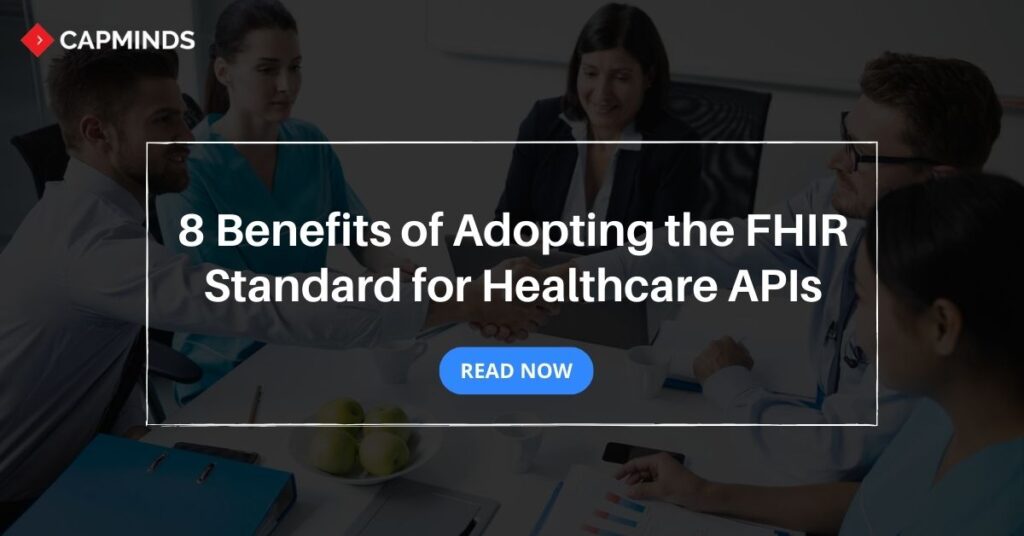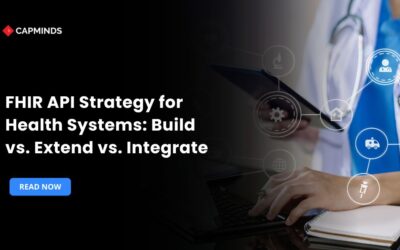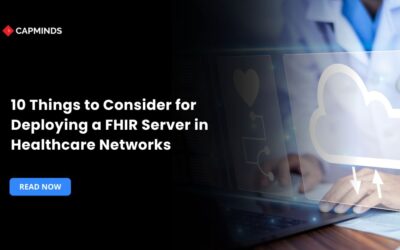8 Benefits of Adopting the FHIR Standard for Healthcare APIs
Interoperability is an essential part of healthcare practices to integrate different healthcare systems within healthcare organizations. However, Seamless data exchange between healthcare systems is necessary and requires the best standards. Such standards is the FHIR, one of the standards that is used for fast health interoperability.
FHIR standards have significantly grown since its release. A survey revealed, 34% of the US healthcare organizations were tested or implementing FHIR APIs. It has gained popularity and become the most popular healthcare interoperability standard that has started to see wide adoption and implementation.
This blog post will walk you through the 8 benefits of adopting the FHIR standard for healthcare APIs. Though benefits vary, it also has a few pitfalls that healthcare practices need to navigate. We’ve also shared the challenges in the Implementation of FHIR in health interoperability.
What is FHIR and Its Importance?
FHIR means Fast Healthcare Interoperability Resources. It is an essential standard for exchanging healthcare data between healthcare systems electronically.
In simple terms, FHIR is a universal language that allows different healthcare systems to communicate with each other seamlessly.
FHIR provides a vast range of solutions for providers with a common framework for exchanging health data, no matter what system the healthcare providers use.
FHIR can be used to transform the health data format from one to another, making it easy for different healthcare providers and systems to share and understand the patient’s medical history, test results, prescriptions, and more.
This standardization not only improves efficiency and accuracy in healthcare delivery but also opens up the possibilities for more innovation.
Related: The Use of HL7 FHIR in OpenEMR: An Exclusive Comprehensive Guide
8 Benefits of FHIR Standard for Healthcare APIs
FHIR standards offer a vast range of benefits for healthcare APIs, From improved interoperability to better data management. Discover the 8 key benefits of FHIR standards for healthcare APIs.
1) Improved Interoperability
The FHIR’s major advantage is it has high capabilities of health interoperability between healthcare systems within the organization. It provides a standardized way for healthcare systems to make it easier to exchange patient data such as demographics, lab results, patient records, medication, allergies, prescriptions, medical history, diagnosis tests, etc.
FHIR allows different healthcare systems to speak the same language to ensure understanding of what data are received, sent, and pushed.
2) Easy to Implement
Easy Implementation is one of the major specialties of the FHIR standards. FHIR uses a modular approach that makes it highly flexible and easy to implement. With redefined resources and standards, it simplifies integration tasks between healthcare systems that previously required extensive mapping.
By leveraging FHIR APIs, healthcare systems can quickly exchange data and accelerate the development of healthcare applications.
3) Scalability
FHIR is specially designed for larger-scale healthcare system interoperability. However, the use of open standards and modern APIs allows the FHIR interfaces to be developed and allowed by a wide range of healthcare organizations and vendors. This scalability allows a wide range of healthcare systems and apps to connect and communicate with ease.
The resources are based on internet and web standards making it easier for implementation across platforms and flexibility. Modular components and built-in extensibility create flexibility to meet diverse system requirements and integration needs. Overall, these factors allow FHIR-based systems to readily scale across facilities, regions, and use cases.
4) Enhance Patient Engagement
The FHIR standard makes it easier to share the patient’s healthcare data information between healthcare systems. This can enhance patient engagement in many ways.
- Access to a patient’s medical records empowers patients to be more informed about their care.
- APIs enable the integration of patient portals with EHRs for scheduling appointments, messaging, virtual consultation, etc.
- Remote Monitoring Devices can feed data directly to the provider’s system through the FHIR interface.
The FHIR enables patients to more seamlessly interact with healthcare systems and be active in managing their health. This standard makes health data more accessible to patients and makes it easier to integrate systems they directly use.
5) Security and Privacy
This Interoperability standard provides a modern framework for exchanging healthcare data while maintaining strong security and privacy protection. FHIR utilizes current web standards and technologies like JSON and OAuth 2.0 to enable secure authentication and authorization, offering more relief for providers that the patient data is highly secured.
This security standard not only assures healthcare organizations but also builds confidence for patients that their crucial health and personal data are secured.
6) Cost-efficiency
If healthcare organizations can significantly reduce the complexity of organizing and managing health data, the more the healthcare practices can reduce the complexity of workflow and focus more on better patient care. However, healthcare practices are developing this as a one-time that can be used over a lifetime over and over again.
FHIR enables healthcare providers to share data more easily and flexibly at a lower cost compared to the legacy approach. This interoperability and cost-saving helps healthcare practices of all levels and deliver higher quality care for patients.
7) Better Patient Experience
FHIR empowers patients by offering a complete overview of the health records by making it easy to implement and integrate between various devices and different applications.
When patients have a complete overview of their health data records, it’ll keep them updated with their health information and make better-informed decision making.
This accessibility and empowering of patients by providing complete health information will ultimately lead to better patient experience and engagement.
8) Data Management
Another benefit of FHIR is the efficient data management for healthcare systems. By providing a common framework for exchanging health data, FHIR enables easier analysis of patient data across various healthcare systems. This ultimately reduces duplicate tests and procedures which improves care coordination and allows advanced analytics and population health tools.
The use of modern web standards and APIs also enables easier integration with new technologies for managing and securing data efficiently. Overall, FHIR improves effective data sharing and data management for better outcomes and lower costs.
FHIR Implementation Challenges
Though challenges vary, FHIR does have a few challenges during implementation. Healthcare practices must know the potential challenges of FHIR in health data exchange to navigate for seamless interoperability.
Related: 5 Common Mistakes That Occur When Transmitting EHR Data Through FHIR
Unavoidable Security Issues
As healthcare data exchange becomes easier with the FHIR, unavoidable security issues may arise during the implementation. Healthcare practices must implement strong authentication, authorization, encryption, and audition controls to protect sensitive patient health data.
Solution: Include robust identity and access management, TLS encryption, consent directives, and centralized security monitoring.
Technical Hurdles
FHIR is complex and implementing it for seamless health data exchange requires technical expertise. Challenges include mapping existing data to FHIR resources, setting up servers and APIs, handling versioning issues, and integrating with legacy systems.
Solution: Having an experienced integration team and reusable code frameworks can smooth the technical hurdles of FHIR adoption in health data exchange.
Need to Tailor FHIR integration for Practice Needs
FHIR provides healthcare data interoperability, but implementation must be tailored for specific healthcare practice workflow and systems.
Solution: Careful analysis of clinical needs and requirements will identify which FHIR resources and API capabilities to focus on. Implementation should start small and then iterate to meet evolving requirements.
Managing Data Across Unintegrated Systems
Healthcare organizations might have unintegrated systems. FHIR improves interoperability but some legacy systems won’t integrate.
Solution: A Holistic Data management strategy is needed to bridge gaps between systems. APIs, interfaces, and data mapping help connect disparate systems.
CapMinds Health Interoperability Solution
Even though FHIR provides a vast range of health interoperability advantages, navigating through all the challenges is necessary for healthcare practices for seamless health data exchange.
For better interoperability, Healthcare practices need to rely on an experienced technical team to ensure seamless data exchange between healthcare systems. CapMinds can be your go-to interoperability solution.
Why can CapMinds be your Go-to Interoperability Solution?
- We are experienced professionals with years of experience in the field.
- Our technical team is an expert who will analyze your healthcare practice thoroughly to tailor the Interoperability solution.
- We prioritize safety, security, encryption, and authentication to protect your healthcare practice patient’s data.
- Our comprehensive solution ensures seamless interoperability adhering to industry standards, and using standard protocols.
- We offer comprehensive training sessions to healthcare staff.
- Our affordable health interoperability solution benefits healthcare practice at all levels.
If you want to efficiently flow health data between your healthcare systems, we will assist you by navigating all the potential challenges and ensuring seamless health data exchange.
Reach out to CapMinds Health Data Exchange Solution for your Healthcare Practice.




